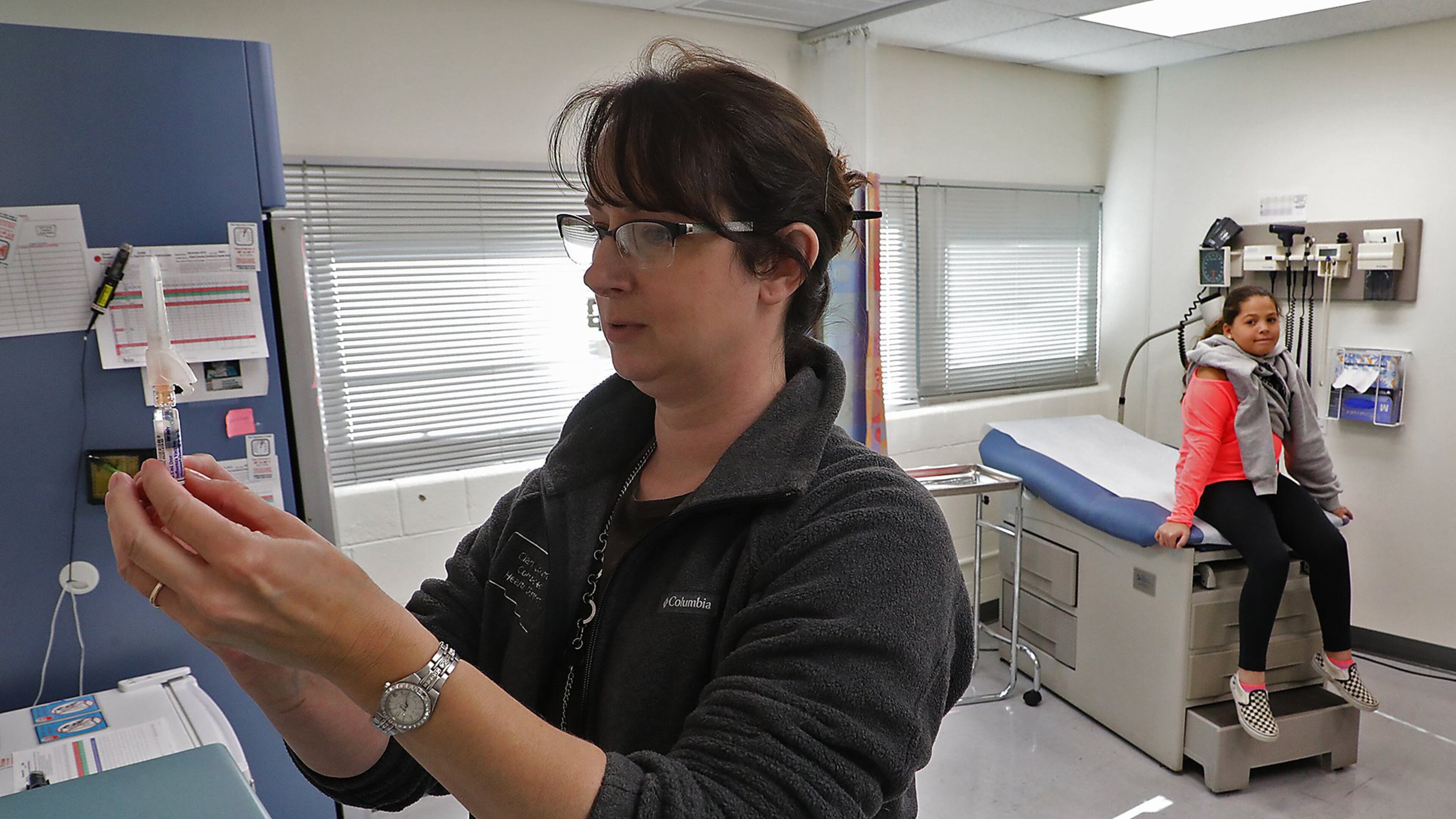Flu activity picks up in Georgia as death toll rises

The pager for Dr. Jamie Woods Green seemed to vibrate almost nonstop on Christmas with calls pouring in from parents of sick children with high fevers, vomiting and fatigue.
The Conyers pediatrician knows to expect a handful of flu-related illnesses on any given day around the holidays. But this was more than usual – a lot more.
“I was actively trying to talk to parents about what to do, and whether their child could be treated at home or should go to the ER,” she said, “and before I got off the phone, my pager was vibrating again. It was pretty astounding, really.”
And it has barely let up since.
The 2019-20 flu season got off to a fast start, and the number of cases has been steadily rising over the past several weeks. Health officials say flu activity is widespread, and many are are concerned that there could be even more of an uptick after the holiday break, when kids return to school.

Almost 1 in 10 patient visits (9.6%) to doctors were for the flu during the week ending Dec. 21, according to the latest surveillance report from the Georgia Department of Public Health. That marks a jump from 6.7% the week before.
Flu levels are much higher than around this time during the previous two flu seasons. That includes the brutal 2017-2018 flu season, which turned out to be one of the worst on record with 145 people in the state dying from flu-related causes and more than 3,000 people in metro Atlanta hospitalized for flu-related illnesses. Flu activity didn’t surge that season until after Christmas.
Meanwhile, the number of flu-related hospitalizations in metro Atlanta has reached 387 this season, and the number of flu-related deaths in Georgia has climbed to seven. Four of those who have died were 49 or younger.
Georgia is one of 25 states with high flu activity, according to the latest surveillance report from the Centers for Disease Control and Prevention. Those other states include Alabama, South Carolina, Kentucky and Louisiana.
A rough flu season in Australia had medical experts on high alert for potentially the same in the U.S. Australia, which saw an earlier-than-usual peak of flu cases, was hit hard with a particularly virulent flu strain, H3N2, which generally causes more severe illness, especially in older people.
Public health experts stress that the Australian flu season doesn’t always predict the U.S. one. Even within the U.S., there can be regional differences. Flu activity here typically peaks between December and February.
“It’s always unique and always hard to predict,” said Ted M. Ross, the director of UGA’s Center for Vaccines and Immunology. “It could fade away after holiday break. Odds are, it will continue to increase, and when kids return to school we will see large increases in flu cases.”
MORE: UGA gets major funding to develop universal flu vaccine
Influenza B is the predominant strain in Georgia and across the country, though multiple strains are circulating, according to the CDC.

The flu season usually starts to recede in March but can extend into May — as it did last flu season.
Experts say it’s not too late to get a flu shot. It takes about two weeks after vaccination for antibodies to develop in the body, according to the CDC.
The vaccine can offer protection even if you come down with the illness. It lessens the severity of the flu and reduces the chance of experiencing complications, health officials said. Getting a vaccine also can shorten the length of the illness if you do get sick.
That’s something Dr. Green is seeing first hand. She said children with the flu who have not had a flu shot generally have higher fevers of 103 and 104 degrees and have more severe symptoms, including vomiting and difficulty eating. Her young patients who were vaccinated this season tend to have fevers of around 101, more mild symptoms and are recovering more quickly.
The flu causes fever, headache, muscle pain and can lead to complications such as pneumonia, which can be serious and even deadly. Each year, 5% to 20% of the U.S. population gets the flu. Seniors, young children and people with chronic health conditions are at most risk for serious flu-related complications, but the flu also kills healthy people every year.

MORE DETAILS
Flu activity has risen steadily and is considered widespread in Georgia. Levels are also higher than they were at this time in recent years.
By the numbers:
9.6% — patient visits to doctors for the flu during the week ending Dec. 21.
6.6% — patient visits to doctors for the flu around this time in 2018.
4.7% — patient visits to doctors for the flu around this time in 2017.
5%-20% — how much of the U.S. population gets the flu each year. Tens of thousands are hospitalized, and thousands die from flu-related illness.
387 — the number of flu-related hospitalizations in metro Atlanta so far this flu season. The number of flu-related deaths in Georgia has climbed to seven.
MORE: When can you go back to work if you have the flu?
FLU PREVENTION TIPS
People should always practice good health hygiene, but it is particularly important now with the flu circulating.
Dr. Andi Shane, medical director of hospital epidemiology at Children’s Healthcare of Atlanta, said key strategies for stopping the spread of the flu include:
- getting the flu shot. It's still not too late to get a flu vaccine.
- washing your hands, and your children's hands, frequently, especially after coughing or sneezing. You can also use an alcohol-based sanitizer to keep hands clean.
- covering your cough and sneezes with the inside of your elbow or a tissue that is then discarded.
- Staying home when sick. The Centers for Disease Control and Prevention recommends staying home for at least 24 hours after a fever is gone (except to get medical care or other necessities). The fever should be gone for at least 24 hours without the use of a fever-reducing medicine, such as Tylenol.
- taking care of yourself. To help your immune system be in good enough shape to fight off the flu and other germs, eat a balanced diet, get plenty of sleep and exercise.

